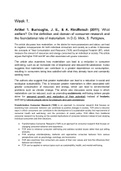Week 1.
Artikel 1. Burroughs, J. E., & A. Rindfleisch (2011). What
welfare? On the definition and domain of consumer research and
the foundational role of materialism. In D.G. Mick, S. Pettigrew,
The article discusses how materialism, or the desire for more possessions and status, can lead
to negative consequences for both individual consumers and society as a whole. It discusses
the concepts of Total Consumption and Resource (TCR) and Ecological Footprint (EF), which
measure the amount of resources and energy consumed by an individual or society. The article
argues that higher TCR and EF are often associated with greater materialism.
The article also examines how materialism can lead to a reduction in consumer
well-being, such as an increased risk of depression and reduced life satisfaction. It also
suggests that materialism can contribute to a greater dependence on consumption,
resulting in consumers being less satisfied with what they already have and constantly
seeking more.
The authors also suggest that greater materialism can lead to a reduction in social and
ecological sustainability. This is because greater materialism is often associated with
greater consumption of resources and energy, which can lead to environmental
problems such as climate change. The article also discusses some ways in which
materialism can be reduced, such as promoting eudaimonic well-being (where people
strive for personal growth and realization of their potential) instead of hedonic
well-being (where people strive for pleasure and pain avoidance).
Transformative Consumer Research (TCR) is an approach to consumer research that focuses on
examining how consumer behavior can contribute to positive changes in society. TCR aims to discover
ways in which consumers can contribute to the development of a sustainable society, the improvement of
consumer health and well-being, and the promotion of social justice. TCR differs from traditional
consumer research by focusing on the societal implications of consumer behavior instead of just studying
individual consumers and their decisions.
● Transformative Consumer Research (TCR) is an approach to consumer research that focuses on
changing consumer behavior and experience.
● TCR aims to enhance consumer well-being and address societal issues rather than just selling
products.
● TCR employs interdisciplinary methods and approaches consumer behavior from various
perspectives such as psychology, sociology, and economics.
● TCR also examines how consumers are aware of their own values and how this influences their
behavior and choices.
● TCR can be applied to various topics such as sustainability, health, and mental well-being.
,
,Artikel 2. Reynolds, Thomas J., and Jonathan Gutman.
"Laddering theory, method, analysis, and
interpretation." Journal of Advertising Research 28.1 (1988):
11-31.
This article discusses the laddering technique, which is a method used to understand how
consumers translate the attributes of products into meaningful associations with respect to
self-defining attitudes and values. The article explains the underlying theory of Means-End
Theory and the elements of the means-end chains representing the cognitive levels of
abstraction: attributes, consequences, and values. The article also covers the interview
environment, probing techniques, and the analysis of laddering data, including the construction
of a hierarchical value map (HVM) and the determination of dominant perceptual orientations.
Additionally, the article discusses the potential applications of laddering for marketing
decision-making, such as perceptual segmentation and the development and assessment of
advertising.
Definitions:
● Laddering: A research methodology used to understand how consumers translate the
attributes of products into meaningful associations with respect to self-defining attitudes
and values.
● Means-End Theory: The underlying theory behind laddering, which posits that
consumers make decisions based on the functional and psychological benefits they
expect to receive from a product or service.
● Hierarchical Value Map (HVM): A graphical representation of the cognitive hierarchical
value structure that is derived from laddering data, which shows the interrelation of
attributes, consequences, and personal values for a given product or service category.
● Perceptual Orientations: Dominant pathways (connections among elements) that are
determined through laddering data, which can be used to understand how consumers
perceive and make decisions about a product or service.
● Segmentation: The process of classifying consumers based on their values orientations
in order to understand them as consumers and develop marketing strategies.
● Implication Matrix: A matrix that represents the number of direct and indirect linkages
between the qualitative concepts elicited during the laddering process, which is used to
construct the HVM.
● Advertising Strategy: A plan that is developed based on laddering data and perceptual
orientations to effectively communicate the values and benefits of a product or service to
consumers.
,





